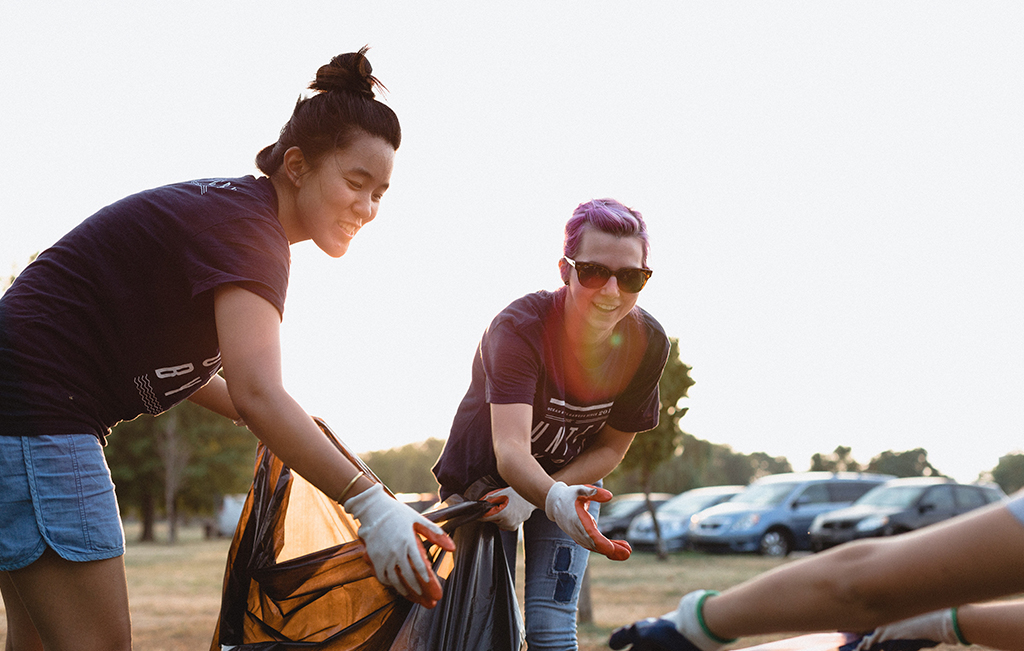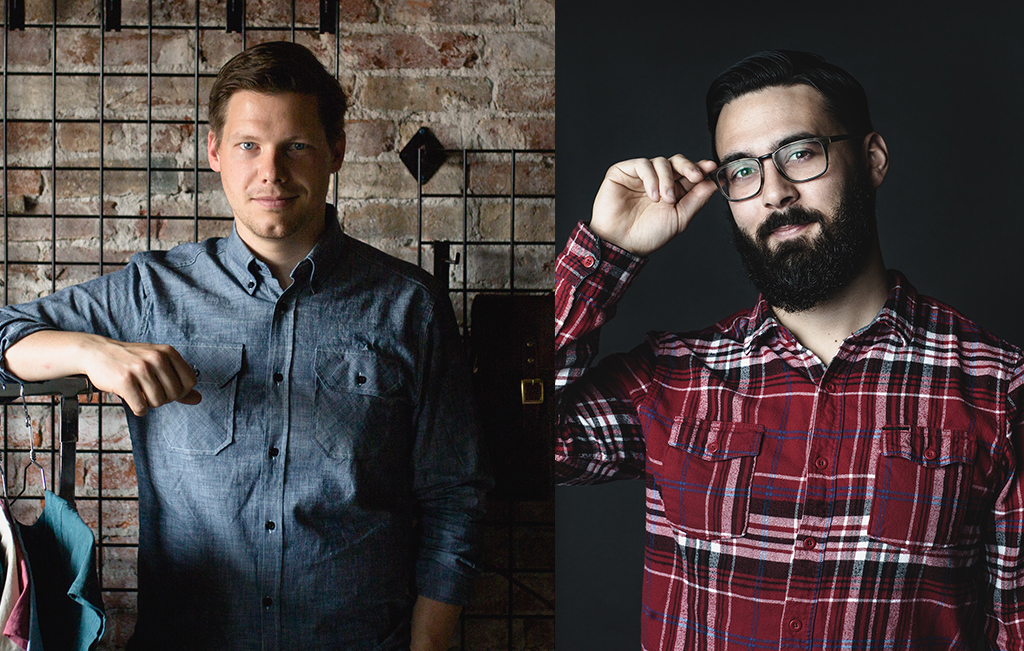On a muddy shore, five volunteers dig for tires. A dozen comb the beach for old water bottles and railroad ties. Several cut tree branches entangling vehicle carcasses. A person operating a skid-steer loads a barge with torched pieces of a boat’s steam tank, while another hauls decrepit trash from an amusement park that burned down in 1927.
For decades, the New Jersey Department of Environmental Protection struggled with the cost and scope of cleaning up Burlington Island, a 300-acre slice of land in the Delaware River, south of Bristol. The island had become an Army Corps dump site and by 2012, the chemical pollution was so bad that the Burlington, New Jersey, mayor banned all recreational use. Enter an unlikely hero: outdoor apparel brand United By Blue.

United By Blue hosts cleanups throughout the year.
In February 2019, a cleanup crew from the outdoor-lifestyle brand spent two weeks removing 96,100 pounds of trash from the island. This marked a milestone for founders Mike Cangi, 31, and Brian Linton, 32. With the help of more than 30 volunteers and team members and a paid crew of Public Works staff, private contractors and city employees, United By Blue executed a large-scale, logistically challenging cleanup that had stymied local resources for years.
It’s a unique tack for a brand that sells T-shirts and totes, but it’s the one Cangi and Linton always envisioned for United By Blue. Founded nearly a decade ago as an environmental conservation organization, business has always come second for the brand. “We took that approach from day one, and it still holds true today,” Cangi says. “Businesses have a responsibility to be changemakers. We want to do more than just sell things.”
Cangi and Linton met in 2009 when the former, a sophomore business student at Temple University in Philadelphia at the time, interned at Sand Shack, a sustainable jewelry and apparel company Linton founded in 2006. The company donated 5 percent of its proceeds to ocean conservation, a mission that was dear to Linton, who grew up snorkeling, diving and raising fish (at one point, he had 30 tanks in his childhood bedroom) in Singapore and Japan. Ocean conservation also resonated with Cangi, who spent his summers on the Jersey shore.

United By Blue founders Brian Linton and Mike Cangi.
But both Cangi and Linton wanted to do more than cut a check. They wanted a way to measure the tangible, lasting impact of a business while creating products they would wear themselves. And so in 2010, when Cangi was 23 and Linton 24, they closed Sand Shack and started United By Blue with a mission: For every product purchased, United By Blue would remove one pound of trash from oceans and waterways.
Nine years later, United By Blue still prioritizes its environmental mission over business goals. But Cangi admits the decision has not always been easy. For example, their wholesale margin shrunk from 60 percent to just 15 percent in 2011 due to the higher cost of using banana-fiber bags instead of plastic bags and paper for packaging. Meanwhile, the total cost of each cleanup runs between $2,000 and $5,000. To continue investing in their environmental goals, Cangi and Linton had to raise the price of some of their products. They continue to cut costs in manufacturing where they can and look for partners like Cascadian Farm Organic and EcoSmartPlastics to donate food and supplies to the cleanup events.
Not compromising its environmental mission has been the key to United By Blue’s ability to make a quantifiable impact. As of October, more than 14,000 volunteers have cleaned up more than 2 million pounds of trash at 270 United By Blue-hosted cleanups.
“If we can change mindsets at the volunteer level, those people become the changemakers in their own communities,” Cangi says. “Our long-term goal is not just about removing trash, but the education piece of these cleanups where people are becoming more aware of the issues facing the environment, specifically the oceans, and then being able to leave with actionable changes.”
It jibes with the company’s original mission and its newest goal: eliminating all plastics from its supply chain and business operations by World Oceans Day in June 2020. United By Blue has committed to eliminating all poly bags, swift tags, bubble bags, plastic shrink wrap and plastic tape.
Ultimately, Cangi and Linton want to eliminate the need for their mission altogether. “We gave the ocean a solution by picking up trash before it gets out there, and now we want to give the consumer tools to keep going,” Cangi says. United By Blue sells reusable meal kits, straws and totes, and its brass provide other businesses with lessons about eliminating waste in the manufacturing processes. “That’s how we can have an amplifying impact over the next 10 years.”
Editor’s note: In November, United By Blue partnered with REI Co-op as part of #OptOutside, hosting cleanups ahead of Black Friday and selling limited-edition Opt to Act DIY cleanup kits (a mesh trash bag, protective gloves and bandana) for $10.


